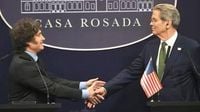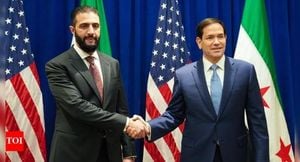On September 22, 2025, the financial world’s attention swung toward Argentina as US Treasury Secretary Scott Bessent publicly pledged to provide “all options for stabilisation” to President Javier Milei, a move designed to help the embattled country avoid another economic tailspin. The announcement, made via a series of posts on X (formerly Twitter), sent immediate ripples through global markets and offered a rare glimmer of hope for a nation long buffeted by currency crises, inflation, and political volatility.
Bessent’s statement, which came just a day before a highly anticipated meeting in New York between Milei, Bessent, and US President Donald Trump, was striking in both its timing and scope. According to Bloomberg, Bessent outlined an array of potential tools under consideration: currency swap lines, direct currency repurchases, and the deployment of US dollar-denominated debt from the Treasury’s exchange stabilization fund. While such direct loans from the US Treasury to a foreign country are uncommon, they are not without precedent—recalling the Clinton administration’s $20 billion rescue package for Mexico in 1995.
Financial markets responded with enthusiasm. Argentina’s dollar bonds maturing in 2035 surged nearly eight cents on the dollar, trading above 55 cents by the end of the session. The Argentine peso, which had been under intense pressure, strengthened by almost three percent to 1,432 per dollar as of 12:45 pm local time. The country’s benchmark S&P Merval stock index also jumped more than six percent, signaling renewed investor confidence—at least for the moment.
“For Washington, Milei represents more than an economic partner: He is also a strategic geopolitical ally as the US seeks to build a bloc of like-minded governments in Latin America,” Claudio Zampa, founder of Mangart Capital Management, told Bloomberg. The support comes as the Trump administration has sought to assert a more robust presence in the region, contrasting sharply with its hardline stance toward other Latin American nations, such as Brazil and Venezuela.
Bessent, in his remarks, described Argentina as “a systemically important US ally” and stressed the potential for private investment in the country. His comments followed a rare visit to Buenos Aires five months earlier, during which he called the International Monetary Fund’s (IMF) $20 billion agreement with Argentina a “fulcrum day” for the nation’s crisis-prone economy. At that time, Bessent downplayed the likelihood that Milei would need to spend heavily to defend the peso, saying, “The good thing about having the money is the bigger your war chest, the more unlikely that you’re going to have to intervene. It’s going to be a smoothing function. I’m going to be watching it closely.”
The IMF, for its part, welcomed the US Treasury’s show of support. Kristalina Georgieva, the IMF’s Managing Director, posted on X that Bessent’s pledge “underscores the crucial role of partners in promoting strong policies for stabilisation and growth” in Argentina. The IMF’s $20 billion program, finalized in April 2025, remains a cornerstone of Argentina’s current economic strategy.
Yet, the optimism was tempered by the realities on the ground. Last week, Argentina’s Central Bank was forced to sell $1.1 billion over three days to prop up the peso as market pressure mounted and sovereign bonds posted the worst losses in emerging markets. The government simultaneously announced a temporary halt on crop tariff exports, a move intended to bring in more US dollars and shore up foreign currency reserves.
“The most important thing is for the exchange market to calm down so the Central Bank doesn’t lose any more foreign currency,” said Matias Montes, head of strategy at EMFI Securities, in comments reported by Bloomberg. The US Treasury’s intervention, if as forceful as suggested, could help stabilize Argentina’s financial system and ease political anxieties ahead of the country’s crucial midterm elections on October 26, 2025.
The upcoming elections represent President Milei’s biggest electoral test since assuming office in 2023. Recent weeks have seen his political fortunes waver: a bribery scandal involving his sister and top adviser, Karina Milei, rocked his administration, and his party suffered a stinging defeat in a key Buenos Aires Province vote. Compounding these woes, Congress has overturned some of Milei’s vetoes on popular spending measures, such as education and healthcare, raising fresh doubts about his ability to govern effectively.
Against this backdrop, Bessent’s pledge and the high-profile meeting with Trump could not come at a more critical juncture. Malcolm Dorson, senior portfolio manager at Global X Management, summed up the stakes: “If Milei and Bessent walk out of tomorrow’s Trump meeting with even a vague roadmap for near-term US support, it’s bullish for Argentinian assets.”
Economic indicators, however, remain bleak. Output contracted slightly in the second quarter of 2025, with analysts forecasting another decline for the July-September period. Unemployment is still elevated compared to pre-Milei levels, and government surveys suggest more employers in key sectors like manufacturing and construction are planning layoffs rather than new hires in the coming months.
Despite these challenges, Milei and his economy minister, Luis Caputo, expressed gratitude for Bessent’s support in separate social media posts on September 22, 2025. Their public thanks underscored the importance of international backing as the administration navigates a minefield of economic and political risks.
Meanwhile, Bessent made clear that the US is prepared for a “large and forceful” intervention in Argentina if necessary, according to a CNBC report. The Trump administration, as reported by Dow Jones & Company, is actively reviewing all available options to provide Argentina with a financial lifeline should the situation deteriorate further.
Milei’s relationship with Trump has been carefully cultivated, with the Argentine president visiting Mar-a-Lago shortly after his election victory in November 2024. This ideological alignment has helped position Argentina as a key US ally in the region, even as the Trump administration adopts a tougher stance toward other Latin American governments.
Looking ahead, the outcome of the Milei-Trump-Bessent meeting in New York could prove pivotal. If the US delivers on its promise of stabilization support, Argentina may yet avoid another economic crisis and restore investor confidence. But with midterm elections looming and domestic challenges mounting, the path forward remains fraught with uncertainty.
For now, Argentina stands at a crossroads—its fate hanging in the balance as global markets, political rivals, and everyday citizens watch closely for the next move from Washington and Buenos Aires.




